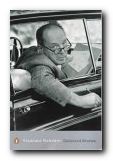a critical examination of Nabokov’s collected stories
‘Orache’ (1932) the story with which ‘A Bad Day’ is twinned, seems more successful partly because the characterisation of Peter is less sentimental, because there is less straining for the evocation of atmosphere, and because the story is more concentrated in its purpose.
 Peter learns at school that his father is to be involved in a duel, and he finds it difficult to control his emotions until classes finish. Since his mother and sister are on holiday he is isolated with this anxiety when he goes home, and everything seems to remind him of the danger in which his father is placed. At dinner his father shares jokes with a friend whilst Peter wonders why nobody is talking about the duel. Next day at school however, he learns that the duel has in fact already taken place: the opponent fired first and missed, and his father fired his own shot into the air. Peter breaks down in tears with relief.
Peter learns at school that his father is to be involved in a duel, and he finds it difficult to control his emotions until classes finish. Since his mother and sister are on holiday he is isolated with this anxiety when he goes home, and everything seems to remind him of the danger in which his father is placed. At dinner his father shares jokes with a friend whilst Peter wonders why nobody is talking about the duel. Next day at school however, he learns that the duel has in fact already taken place: the opponent fired first and missed, and his father fired his own shot into the air. Peter breaks down in tears with relief.
The story is more tightly structured thanA Bad Day, held together by the tension between Peter’s emotional upset and a recurrent image of duelling. Peter sees his father at fencing practice each morning; he himself ‘duels’ in a fight at school; he sees a picture of two men duelling in a magazine; reference is made to the duel in Eugene Onegin – ‘Onegin shed his cloak, Lenski plopped down on the boards like a black sack’ (DS, p.53); and the newspaper he sees at school gives an account of his father’s duel.
The story is also more convincingly related from the child’s point of view:
‘His father was busy in a place known as the parliament … there was also something called the Kadet Party, which had nothing to do with parties or cadets’ (p.46)
and there is a more developed blending of third person narrative and interior monologue: ‘never before had he known such tears, do not tell anyone, please, I am simply not well … and again a tumult of sobs’ (p.55).
We know from both Nabokov and Field that the events of ‘Orache’, like ‘A Bad Day’, are largely autobiographical. Unlike its twin however, there are fewer traces of that provenance evident. Certainly the absence of lengthy descriptions or scene-setting for its own sake helps to focus the purpose of the story.
The overt purpose is to present yet another variation on the ‘Russian subject’ of duelling. In this case it is the duel which has already taken place, and the duel which has more effect on a spectator than on the participants. And in terms of the central issue, the father’s honourable action of course illustrates the exact opposite of poshlost.
© Roy Johnson 2005
![]() Vladimir Nabokov: The Collected Stories – Amazon UK
Vladimir Nabokov: The Collected Stories – Amazon UK
![]() Vladimir Nabokov: The Collected Stories – Amazon US
Vladimir Nabokov: The Collected Stories – Amazon US
Vladimir Nabokov web links
Vladimir Nabokov greatest works
Vladimir Nabokov criticism
Vladimir Nabokov life and works